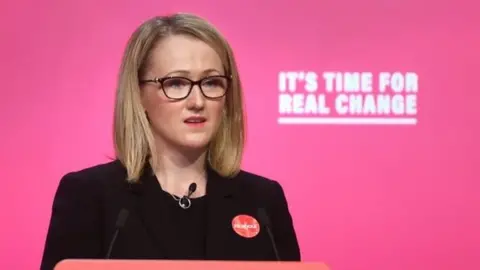Labour leadership: Long-Bailey against abortion after 24 weeks on disability grounds
 PA Media
PA MediaLabour leadership contender Rebecca Long-Bailey has said she disagrees with the law allowing abortion after 24 weeks on the grounds of disability.
The MP - who officially launches her campaign later - said it was her personal view, not a policy position.
Her spokesman said she "unequivocally supports a woman's right to choose".
Leadership rivals, Lisa Nandy and Jess Phillips, backed a call to "defend and extend reproductive rights" - something Mrs Long-Bailey has now also done.
Emily Thornberry highlighted her support for the decriminalisation of abortion in Northern Ireland at her leadership campaign launch.
Allow X content?

Fellow leadership contender Sir Keir Starmer said the law should be changed, so that women were not criminalised for seeking an abortion.
Speaking during a visit to a nursery in Batley, West Yorkshire, he said he wanted it to be seen as a "health issue" and not a "criminal law issue".
"It should be a matter of a woman's right to choose," he added. "I want to see this reviewed and changed. We need to take criminal law out of it."

What is the abortion law in England, Scotland and Wales?
Abortions can take place in the first 24 weeks of pregnancy in England, Scotland and Wales.
However, they have to be approved by two doctors. They must agree having the baby would pose a greater risk to the physical or mental health of the woman than a termination.
Abortions were illegal before the introduction of the 1967 Abortion Act, which initially allowed them to take place up to 28 weeks. This was reduced to 24 weeks in 1990.
Abortions after 24 weeks are allowed only if:
- The woman's life is in danger
- There is a severe fetal abnormality
- The woman is at risk of grave physical and mental injury
Since 2018, women in England have been allowed to take the second of two early abortion pills at home, rather than in a clinic. This brings the rules in line with Scotland and Wales.
Abortion was illegal in Northern Ireland until October last year, when it was decriminalised.

Mrs Long-Bailey's comments on abortion came during last year's general election, in response to questions sent to Manchester candidates by representatives of Salford's Catholic cathedral.
The Salford and Eccles MP, who is Catholic, was asked if she would remove "discrimination on grounds of disability" in abortion law.
"It is currently legal to terminate a pregnancy up to full term on the grounds of disability while the upper limit is 24 weeks if there is no disability," she replied.
"I personally do not agree with this position and agree with the words of the Disability Rights Commission that 'the context in which parents choose whether to have a child should be one in which disability and non-disability are valued equally'."
'Right to choose'
She added: "Whilst I would never contemplate abortion, I have tried to understand the agonising decisions many feel forced to make and what support they would need."
A future Labour government "would propose a wide public consultation on the detail of new laws and regulations" on abortion, she wrote, adding that she would ensure Catholic views would be heard in that debate.
She also wrote about how her Catholic faith inspired her political career and taught her that "the only society we should be striving for is one based on love".
A spokesman for Mrs Long-Bailey accused the Red Roar website, which first reported the comments, of being "fake news peddlers" and said they were trying to "propagate a misleading narrative".
The website also pointed out that Mrs Long-Bailey had been absent from parliamentary votes on allowing abortions in Northern Ireland, tabled by Labour MPs Stella Creasy and Conor McGinn, but did vote in favour of the move last year.
Mrs Long-Bailey's spokesman said: "Rebecca unequivocally supports a woman's right to choose and has only ever voted in favour of extending the right to abortion, such as in Northern Ireland.
"Rebecca's response to the deanery of Salford clarified the existing law and current Labour policy, stating that abortion procedures should be properly regulated, and that women's reproductive rights and the decriminalisation of abortion should be maintained."
'Buffer zones'
The spokesman added that her reply was a "reflection" on her agreement with the commission "rather than her view on policy".
In a separate development, Lisa Nandy and Jess Phillips have backed a call by Stella Creasy to "defend and extend reproductive rights".
Ms Creasy is calling on the five Labour leadership contenders to sign up to a pledge to "oppose any attempt to reduce [the] abortion time limit".
Mrs Long-Bailey has now said she also supports the proposals, saying on Twitter that there had been "some pretty grubby attempts over the last 24 hours to deliberately misrepresent my position".
Ms Creasy is calling for the introduction of "buffer zones" around abortion clinics to allow women to "access pregnancy advice and abortion services free from intimidation" and a range of other measures.
These include making the morning-after pill available free from pharmacies, including for under-16s, in line with legislation in Wales, and plans to scrap the "outdated and paternalistic" law that requires two doctors to give permission for abortions.
Ms Nandy and Ms Phillips registered their support for the pledge on Twitter.
